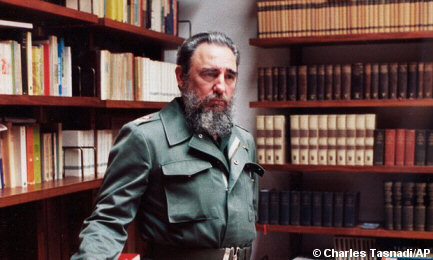 This Is Not A
BLOG!
This Is Not A
BLOG!
Date: 26/11/16
The Last Revolutionary?

Fidel Alejandro Castro Ruz
Revolutionary, politican
b. 13 August 1926, d. 25 November 2016
Right, let's get some things clear, shall we?
Fidel Castro was not a democrat; his régime was often characterised by serious mis-steps in practical, ethical and ideological terms. This - combined with a degree of control-freakery common to all autocrats - led to his government and his nation being the objects of ridicule even from beyond the ranks of the self-righteous 'liberals' who pronounced against him in their wholly-owned corporate newspaper columns. He could (and frequently did) out-bluster any other national leader during his long period of power. Levels of poverty in Cuba remained stubbornly high up to and beyond his term. Oh, and let's carrying on jeering at the sight of sixty-odd-year-old Studebakers trundling around Habana, held together by little more than ingenuity, desperation and piety, shall we?
If all of that is true, or if this is all that is true, then why was Fidel Castro such a towering figure in the second half of the last century, and why does his influence continue today (albeit in attenuated form)?
Perhaps we should bear in mind the achievements of his revolution (and, despite the downplaying of these by our own free, fearless and total independent media right up to today's obituaries by such luminaries of sneer as Rory Carroll, the Guardian's go-to guy for misinformation on Latin America, achievements there definitely were):
- He and his comrades overthrew a dictatorship which, even by contemporary standards in that region, was singularly corrupt
- He turned his nation - which had for generations been nothing more than a 'profit center' and pleasure colony for American corporations, gangsters and whoremongers - into a genuinely independent land (and let us here recall that his turn towards Moscow was due entirely to the malevolent petulance of Washington in imposing a blockade because the interests of the corporations who - then as now - owned the DC political establishment had been affected)
- In a country long riven by immense economic inequality, he succeeded to a large degree in a fairer distribution of the proceeds of Cuba's wealth amongst the population, and the provision of basic needs - food, fuel, health and education services - at or below cost
- In a country where the pure-bred Hispanic population had had a massively disproportionate influence and hold, he opened up the cities to the descendants of the African slaves and their masters (just like his protégés Chavez and Morales were later to do in Venezuela and Bolivia)
- He set Cuba to look outwards at the world, dispatching some of its brightest students to Moscow, Prague and other centres to train in medicine, and then sending them out around the world - especially to southern Africa - to provide free health-care to areas in desperate need of any health-care at all
- And, perhaps most beguilingly and attractively to those of us of a certain world view, he got so far up the collective nose of the US for so long that Uncle Sam was made to look ridiculous and cloddish - indeed, was impelled to make himself look fatuous and vicious - to much of the world. This wasn't just a matter of the repulsion of Kennedy's Bay Of Pigs fiasco; it was the resistance over a period of decades to all American attempts to restore corporate-capitalist 'democracy' to the island - the attempted assassinations, the constant threat of invasion and infiltration, the acts of piracy and terrorism carried out by US-backed operatives against tourist sites in Cuba and even against civilian aircraft carrying teenage athletes home from a tournament (one of the perpetrators, Posada Carriles, still walks the streets of Miami a free man).
The kink that this has all put in the American political psyche - most prominent in the way that candidates of both main corporate puppet parties need to pander to the hyper-militant self-styled 'exiles' in Florida in order to get elected - has distorted the internal politics of the US into grotesquely pretzeloid forms, and has laid bare the hypocrisy of America's 'War On Turrurrr' time and again
Perhaps the one word which most adequately sums up the man and his actions is 'defiant'. His Cuba stood - latterly alone after the collapse of the Soviet bloc - as a reminder that there were other ways - however flawed - of doing things, that it is possible to so order a society and economy that its benefits accrue more equitably, and that it was possible for even a small nation in the shadow of a very large and aggressive neighbour to withstand the pressures of such a position. In the mono-pole world in which we have existed for the last twenty-five years, there is an attraction in such an example, and it may be this which will prove to be Fidel Castro's most enduring legacy.

 This Is Not A
BLOG!
This Is Not A
BLOG!











